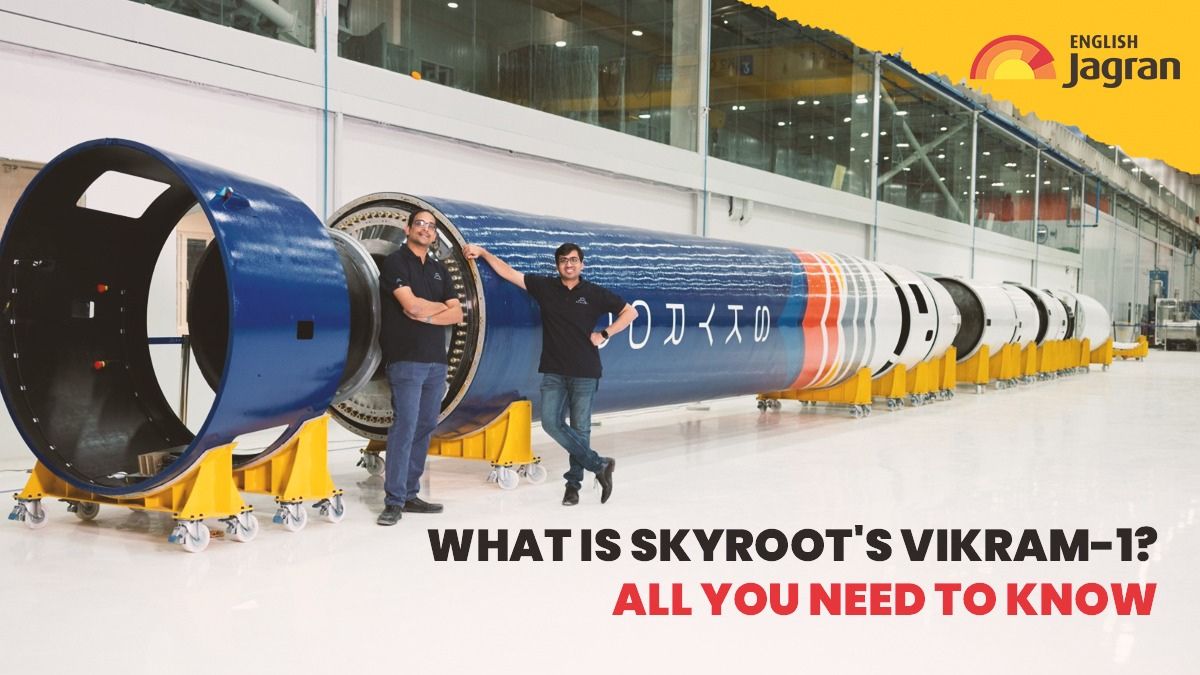- By Vivek Raj
- Sat, 28 Oct 2023 03:10 PM (IST)
- Source:JND
Skyroot Aerospace, a space startup headquartered in Hyderabad, has introduced 'Vikram-1,' a multi-stage launch vehicle towering as tall as a 7-storey building. This rocket represents a pivotal achievement for India's burgeoning space industry, which has experienced substantial expansion due to government-driven reforms in the sector. The launch of 'Vikram-1' is anticipated in the first quarter of 2024.
Vikram-1: All you need to know
Vikram-1 is a multi-launch vehicle designed to carry payloads of approximately 300 kilograms into Low Earth Orbit (LEO). Crafted entirely from carbon fiber and equipped with 3D-printed liquid engines, it's among the select rockets globally capable of deploying multiple satellites into orbit.
ALSO READ: What Makes Tamil Nadu’s Kulasai Dasara Different From Dussehra Festivities Across India | Exclusive
This multi-stage launch vehicle is set to conduct its inaugural space launch in early 2024. It was showcased at Skyroot's new headquarters, 'Max-Q,' in Hyderabad, an event inaugurated by Union Science and Technology Minister Jitendra Singh

Payload Capacity: Vikram-1 is a multi-launch vehicle with the capability to place approximately a 300-kilogram payload into Low Earth Orbit (LEO).
Cutting-Edge Design: This rocket is constructed entirely of carbon fiber and is powered by 3D-printed liquid engines, showcasing its technological sophistication.
Private Rocket Pioneers: Vikram-1 represents India's first privately designed and developed orbital-class rocket. This achievement follows space-sector reforms enabling private firms to design, develop, build, and launch their rockets and satellites.
Rocket Center in South Asia: Skyroot Aerospace's new facility in Hyderabad, Telangana, aptly named 'MaxQ,' is the largest private rocket development center in South Asia. The name 'MaxQ' symbolises the maximum stress and loads a rocket experiences during its ascent.
Space Economy Growth: The Indian space sector, long dominated by ISRO (Indian Space Research Organisation), is witnessing the emergence of startups, contributing to the expansion of the Indian space economy.
Upcoming Maiden Flight: Vikram-1 is expected to perform its maiden flight to space in the first quarter of 2024, reflecting India's strides in the private space sector.
Competing with ISRO: Skyroot Aerospace, by launching its private rockets, competes directly with ISRO's newest rocket SSLV, which carries similar payloads to orbit.
What is Skyroot? Meet the founders behind India’s private space program
Skyroot Aerospace is a pioneering space startup in India that has played a significant role in shaping the nation's private space industry. Established in 2018 by two former engineers from ISRO, Pawan K Chandana and Bharath Daka, the company has emerged as a leader in the private space sector.
The company's first rocket, 'Vikram-S,' marked a milestone as the first privately built rocket successfully launched from ISRO's facility in Sriharikota. Skyroot Aerospace was quick to capitalize on the opportunities presented by ISRO's initiative to allow private startups access to its facilities for tests and launches.
Skyroot Aerospace is named in honor of Vikram Sarabhai, the founding father of India's space program. It reflects the collaborative efforts between private and public players in India's space technology arena, a program initiated by the government in 2021.
Both co-founders, Chandana and Daka, have strong backgrounds in space technology. Chandana worked as an ISRO scientist at the Vikram Sarabhai Space Centre (VSSC) and has a wealth of experience in launch vehicle technology. Daka, on the other hand, served as a flight computer engineer at VSSC, contributing to the development of avionics modules for ISRO's launch vehicles.
